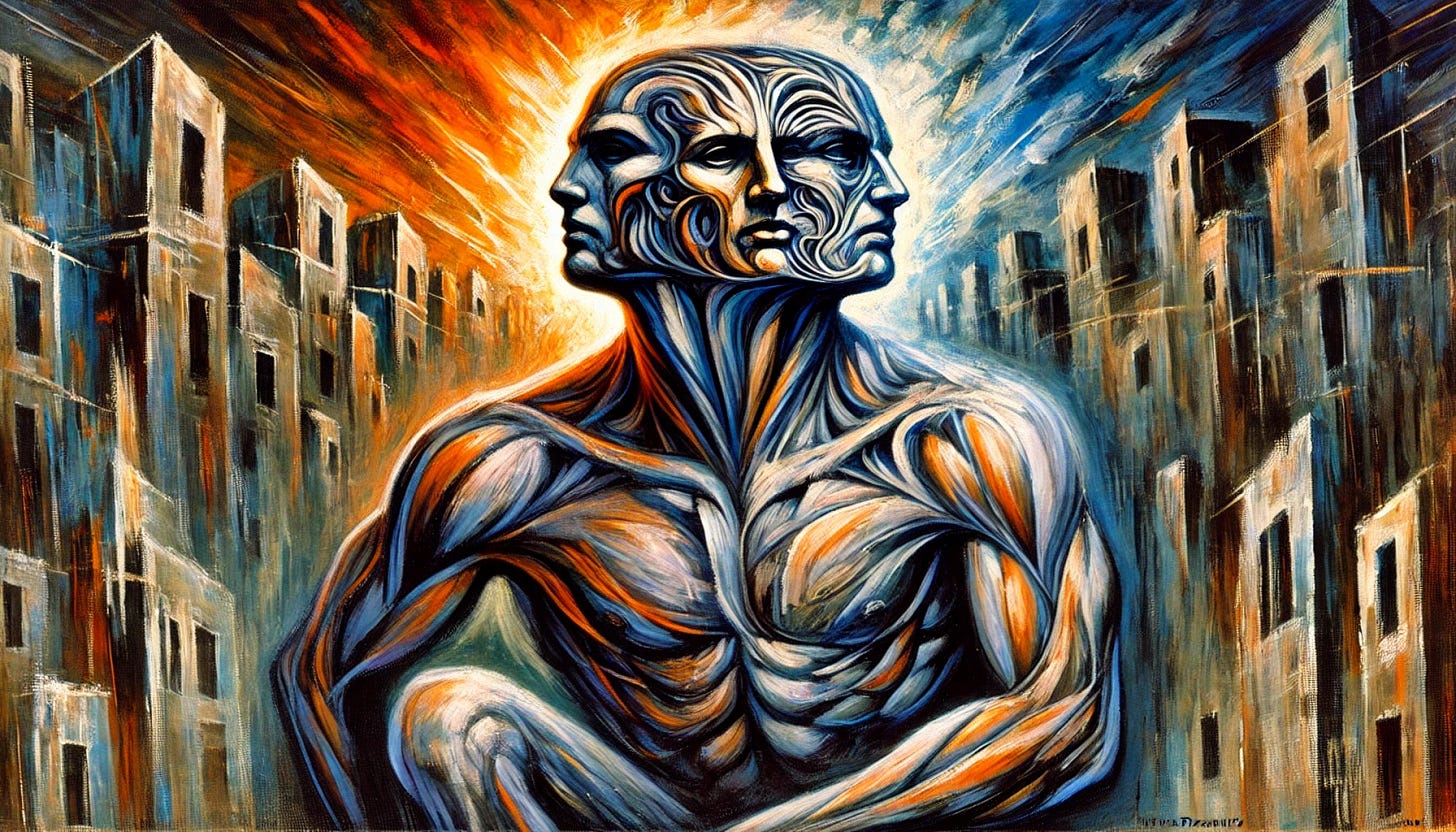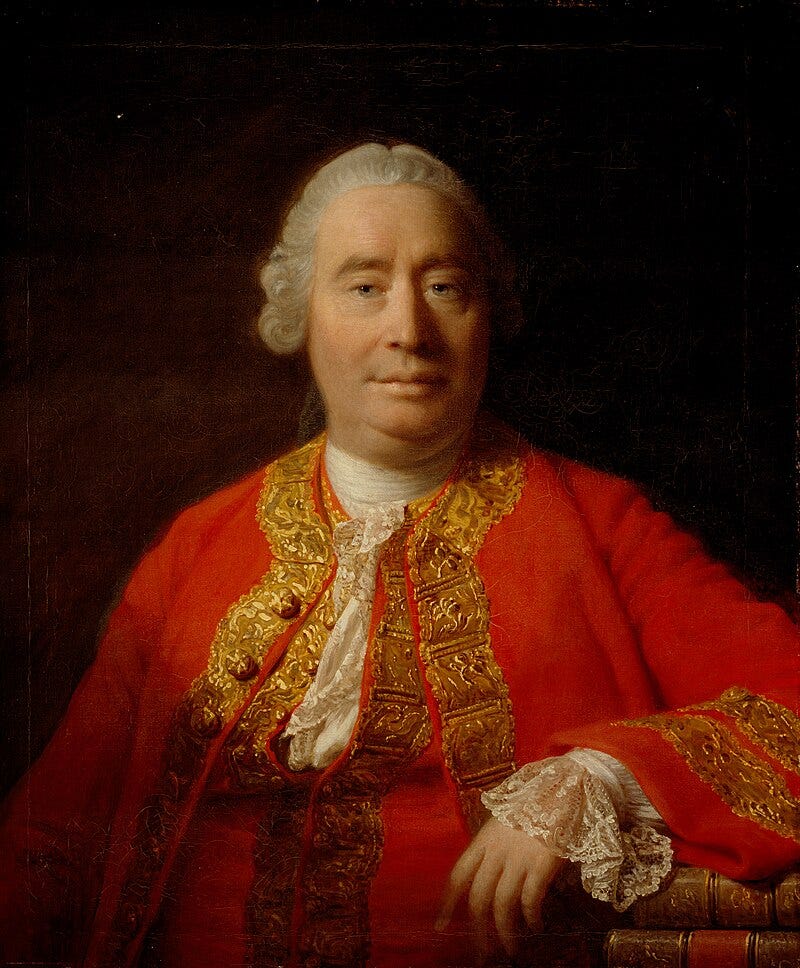On the Self or The Double Man
The Unseen Seer: The Self as Searcher, Never Found
"But," I said, "perhaps you would say he doesn't harmonize with our regime because there's no double man among us, nor a manifold one, since each man does one thing."
"No, he doesn't harmonize."
(Plato, Republic 397e).
But then what masks must we present to the world and what shame comes along with it?
The universal stage-master has departed—all roles are now available, and all men must act every part. In a day, I, myself, have played the clown, the teacher, the son, the husband, the wise man, the fool, the joke, the rough and toughster, the coward, the sycophant—I have pleased the great mob—I have cringed like a sick child—I have licked anus and had my anus licked. In truth, from so much mask-changing, from so many roles reversed and re-reversed, I have often felt myself to be nothing but a biological impulse for the possessing of a personality—a puppet, only, for time’s fist to crux into the correct position the moment required. Often, I was amazed at how easily my soul curled into a worm’s when meeting my boss—how naturally I took on the shared opinions of the rest.
In this, I have experienced such things that gods would thrill at, that the gods knew not; I have known the depredation whose only salvation was in its originality, in the luxurious abandon that led only to tedium. But I was prompted. This world of indulgence and images beckoned with seemingly loving arms, and I went forth.
Later, I knew myself to be nothing but a clot, waiting for the universe to wash away.
But who am I? Nothing, apparently. Where have I gone? I have not the mask to answer such a question. Was it always thus? What has caused my departure?
For a long time, I pondered this—this question of the self and the masks that make us multiple, the fleeting double man that Plato saw as a threat to justice (Plato, Republic 396c).
I thought of those great heaps of humanity blown together, that tumbling, evanescent crowd which places such social pressure on every individual—they, with their endless minor and meaningless interactions that can so distort an opinion.
I thought on how we always find ourselves compelled to take on a certain persona, culturally and economically congenial, and the menace of poverty for those who do not.
Or that most modern of vices, where one is judged for what one seems rather than what one is, and the excessive “seeming” that goes along with it. Always, we are trying to prove our “worth” to others, though—for what it is worth—the value amounts to nothing except for the mask that presented it. What else remains of the person lies crying alone in the dark…
Or how the greatest skill now is that of the actor: for knowledge must be acted out—or it must seem to be, for ignorance is also acted out, but as knowledge—and the narcissists that flourish in such a world as ours.
I thought of the self as a communal act, but small, village-sized, where one simply is because everyone already knows what you are; how one cannot hide from a community that has known you since birth.
In each of my attempts, however, I was halted by a question—more fundamental and troubling in nature: who or what wants the self? That is, what is it about the self that so desires the self? Certainly, no age as ours has been so terrorized by the self and yet so ignorant of what precisely demands it.
But the self? The self? Have any words ever haunted as much as the self? For it is one of capitalism’s great promises that the self lies waiting—somewhere, somewhere... We have only to be successful enough to find it—ourselves waiting... somewhere. It is that dream, that distant dream, laced with glory and wealth, where we attain such prosperity as to ascend this race of puppets, these poor shades who labor under the impositions of society, and become that thing we were always meant to be—our authentic self. True?
But this is an illusion, if not the greatest illusion of capitalism. For between us and ourselves lies a sheet of glass, and though it is only a centimeter thick, it is unbreakable. It is that world of smiling faces, of perfect moments, of life fulfilled, of life complete: the authentic. Another cunning trick—this mess we call life is only fulfilled with death and the annulment of the self, whatever that may be. Rather, capitalism is a realization of the not-self—advertising is an awakening to the unself, to the not-I.
I go on…
The self is a conundrum of insufferable proportions. For it appears that to think on the self, to even question the self—its reality, its existence—is to lose the self. Hume, in his Treatise of Human Nature, expressed much the same thought when he wrote:
"For my part, when I enter most intimately into what I call myself, I always stumble on some particular perception or other, of heat or cold, light or shade, love or hatred, pain or pleasure. I never can catch myself at any time without a perception, and never can observe anything but the perception. When my perceptions are removed for any time, as by sound sleep, so long am I insensible of myself, and may truly be said not to exist” (Hume 252).
The self, then? Vague, nebulous, incomplete—as life is very much incomplete. Hume believed so. Do I believe? Who is asking here? Answer me!
But here comes capitalism to hijack these feelings of doubt and make us slaves to them—a slave to the unself. Authenticity is its design, and ultimately, it becomes its own recursive loop—never attained because of its very awareness. Because to be authentic in a world that constantly measures authenticity is a paradox: to hunger for authenticity is not to be authentic. Right?
Against this, we may argue that the one who truly is—who has no concern with defining what they are, who does not seek the self—is the self. That is, they would simply be—the self attained because it was not sought...
Plato grinds our noses upon a similar idea when he speaks of the just man, who only acts as himself (Plato, Republic 443d). A brave warrior, for example, does not lose themselves in the labyrinth of selfhood because their identity is founded in the essence of what they do—not in how they perceive themselves. There is no self-reflection here. It is why Plato banishes actors, those who can play many parts, from his Republic. For it is in the act of playing others that we risk losing ourselves. In trying on the roles of many, we become aware of the self, and thus forfeit the possibility of simply being—the self we are, not the self we pretend to be...
I go on…
Ultimately, the self-reflexivity of our age—this constant questing for the authentic self—makes us alert to what we are not: the not-self. Thus, the self is lost, and on we go searching, ever unhappy, forever lost, like a wanderer far from home, seeking such masks as best will fit ourselves in this no-world.
But we have done a great loop and come no closer to our goal. I have looked under the mask and found nothing, quoted Hume, Plato, and yet come away empty. Now that I am aware of myself, I am hopeless as to what to do.
One last attempt, one last fickle presumption: if we look closely at Hume’s claim—when I enter most intimately into what I call myself, I always stumble on some particular perception or other—we begin to notice an idea he may have overlooked. Hume catalogs the flux of sensations and feelings that make up our experience, yet—and so strangely for such a great thinker—he appears to ignore or overlook one crucial element: the enduring "I" that is doing the looking.
One must say, then, that the self is the searcher, not the found. The self cannot see itself because the “I” is always the one seeing, rather than the one being seen. It is like the eye that perceives everything but cannot perceive itself; the self remains elusive—not because it does not exist. No. But because its nature is fundamentally different from that which it seeks. Perhaps different from every other thing in existence?
The self is always active, always engaged in the act of perception, thought, and reflection. It does not allow itself to be anatomized, because the self is always the one doing the anatomization. To attempt to grasp it, to pin it down and examine it as one might an object in the world, is to misunderstand its nature entirely. A mirror cannot reflect itself. A fire cannot burn itself. The self cannot be both the observer and the observed.
Again, it is the observer—a fundamental subjectivity that cannot become objective because—sorry to so stress the point—it is always the subject. It is not a thing to be found, not a possession to be claimed, but the act of seeking itself. It exists not as something that can be held—air, water, happiness would be as easy—but only in the motion of pursuit—forever at the periphery of awareness, forever the unseen seer.
What, then, of my masks? And what, then, of this daily shame? Who am I? I have an answer, but still, I draw no closer to my goal. Go on, I must.




How can anyone understand this? xD
"Man is a riddle to the world, and it may be the greatest riddle... It is possible for man to get knowledge of himself from above or below, either from his own light, the divine principle which is within him, or from his own darkness, the elemental demonic principle within him. And he can do this because he is a twofold and contradictory being. He is a being who is polarized in the highest degree, God-like and beast-like, exalted and base, free and enslaved, apt both for rising and for falling, capable of great love and sacrifice, capable also of great cruelty and unlimited egoism." Nikola Berdyaev from his book "Slavery and Freedom"; Chapter 1: Personality.
My oxymoronic advice as a living being? Trust the dead, ignore the living because they always have a personal agenda. The dead no longer can and if they did, it's already be documented and studied to see if it is worthy.